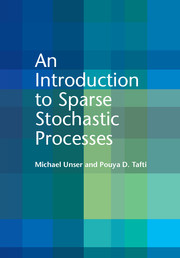Book contents
- Frontmatter
- Dedication
- Contents
- Preface
- Notation
- 1 Introduction
- 2 Roadmap to the book
- 3 Mathematical context and background
- 4 Continuous-domain innovation models
- 5 Operators and their inverses
- 6 Splines and wavelets
- 7 Sparse stochastic processes
- 8 Sparse representations
- 9 Infinite divisibility and transform-domain statistics
- 10 Recovery of sparse signals
- 11 Wavelet-domain methods
- 12 Conclusion
- Appendix A Singular integrals
- Appendix B Positive definiteness
- Appendix C Special functions
- References
- Index
5 - Operators and their inverses
Published online by Cambridge University Press: 05 September 2014
- Frontmatter
- Dedication
- Contents
- Preface
- Notation
- 1 Introduction
- 2 Roadmap to the book
- 3 Mathematical context and background
- 4 Continuous-domain innovation models
- 5 Operators and their inverses
- 6 Splines and wavelets
- 7 Sparse stochastic processes
- 8 Sparse representations
- 9 Infinite divisibility and transform-domain statistics
- 10 Recovery of sparse signals
- 11 Wavelet-domain methods
- 12 Conclusion
- Appendix A Singular integrals
- Appendix B Positive definiteness
- Appendix C Special functions
- References
- Index
Summary
In this chapter we review three classes of linear shift-invariant (LSI) operators: convolution operators with stable LSI inverses, operators that are linked with ordinary differential equations, and fractional operators.
The first class, considered in Section 5.2, is composed of the broad family of multidimensional operators whose inverses are stable convolution operators – or filters. Convolution operators play a central role in signal processing. They are easy to characterize mathematically via their impulse response. The corresponding generative model for stochastic processes amounts to LSI filtering of a white noise, which automatically yields stationary processes.
Our second class is the 1-D family of ordinary differential operators with constant coefficients, which is relevant to a wide range of modeling applications. In the “stable” scenario, reviewed in Section 5.3, these operators admit stable LSI inverses on P′ and are therefore included in the previous category. On the other hand, when the differential operators have one or more zeros on the imaginary axis (the marginally stable/unstable case), they find a non-trivial null space in P′, which consists of (exponential) polynomials. This implies that they are no longer unconditionally invertible on P′, and that we can at best identify left- or right-side inverses, which should additionally fulfill appropriate “boundedness” requirements in order to be usable in the definition of stochastic processes. However, as we shall see in Section 5.4, obtaining an inverse with the required boundedness properties is feasible but requires giving up shift-invariance.
- Type
- Chapter
- Information
- An Introduction to Sparse Stochastic Processes , pp. 89 - 112Publisher: Cambridge University PressPrint publication year: 2014



